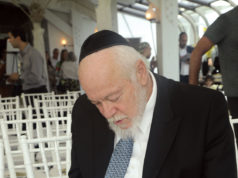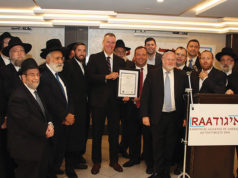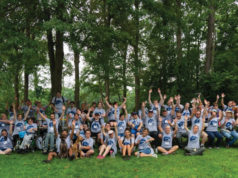
Simon D. Roffe, my grandfather, was born in Morocco. He and his sisters Helen Beyda, Stella Emsellem, Pauline Tawil, Flora Ingber and Juliette Silvera, and his brother, Maurice Roffe, grew up in the French part of Casablanca and attended the French public school, Lycee Lyautey, the same school where high Arab officials sent their children. Students included such elite as the great grandfather of the Moroccan King, Mullai Hassan.
The Roffe’s were a highly respected family in Morocco. One of my grandfather’s uncles was an ambassador to an Arab country and another uncle was the American consul in Morocco. He describes his family life as being honest and trusting.
“In my childhood there was more respect given to parents and teachers and a lot more discipline. Childhood in the early part of the century was a real childhood,” said Mr. Roffe.
“When times were good, we were told about it. When times were difficult, we were told about it.”
Just as truth, honesty, loyalty and religion were important moral influences, French culture strongly influenced the Roffe household as well.
Dating was not permitted. Indeed, my grandfather did not date until he arrived in the United States and was in his mid-20s.
Because his mother spoke Spanish (she was from Tangiers) and his father spoke French (he was from Oran Algeria). Mr. Roffe learned both Spanish and French fluently.
He learned Hebrew as he grew up and studied Italian as well. “I did not experience prejudice. I played with Arabs as well as Jews,” he said.
My great grandfather David Roffe did his business in a coffee shop in Casablanca. All day long, he would sit at a table and businessmen would come and go and conduct their business with him.
The family lived in an apartment in Casablanca, which my grandfather and father went back to visit, as well as the shul they prayed at, and the apartment they lived in. They even found the cemetery plot where my great grandfather was buried.
Coming to America was a new experience for my grandfather. While Morocco was an agricultural nation, America was advanced technologically. There were tall buildings and skyscrapers, trains and subways. “It was unbelievable,” he said.
“When my father arrived, he was detained at Ellis Island for two days. In Morocco, he was always treated with great respect. In the US he was not given the respect he felt he deserved. He was very upset about this and vowed never to return to America again. So my mother Rachel, my sister Flora and myself, had to remain in Morocco until he died in 1932,” he said. My grandfather came to the US in 1936.
History of Jews In Morocco
In 1492, when Jews were expelled from Spain as part of the expulsion and following Spanish Inquisition, many Sephardic Jews fled across the Straits of Gibraltar into the North African area now known as Morocco.
There the Jews lived peacefully for hundreds of years under Muslim rule, much the same as they did in Arab-occupied Spain. During the ensuing centuries, as the outside world developed industrially, the Arab sultans closed themselves off from modern development.
Moroccan sultans of the early 1900s were too weak to keep control over the country. France already occupied bordering Algeria. When fighting broke out in Morocco, France moved in to keep the peace. The British backed the French,
In 1907, the Sultan signed the Treaty of Fez, giving the French control of Morocco’s finances and government. They also kept an army there. There were three areas of Spanish influence recognized and administered by Spain, which was only a few miles to the north, across the Strait of Gibraltar. After World War I, many of the country’s Jews left for America.
Due to Spanish forces fighting against the French and uprisings by armed tribesmen, France did not gain complete control of Morocco until 1934. They did, however, develop the schools, roads, industry, hospitals and other necessary infrastructure.
France granted independence to Morocco in 1956 and the country established a constitutional monarchy.



